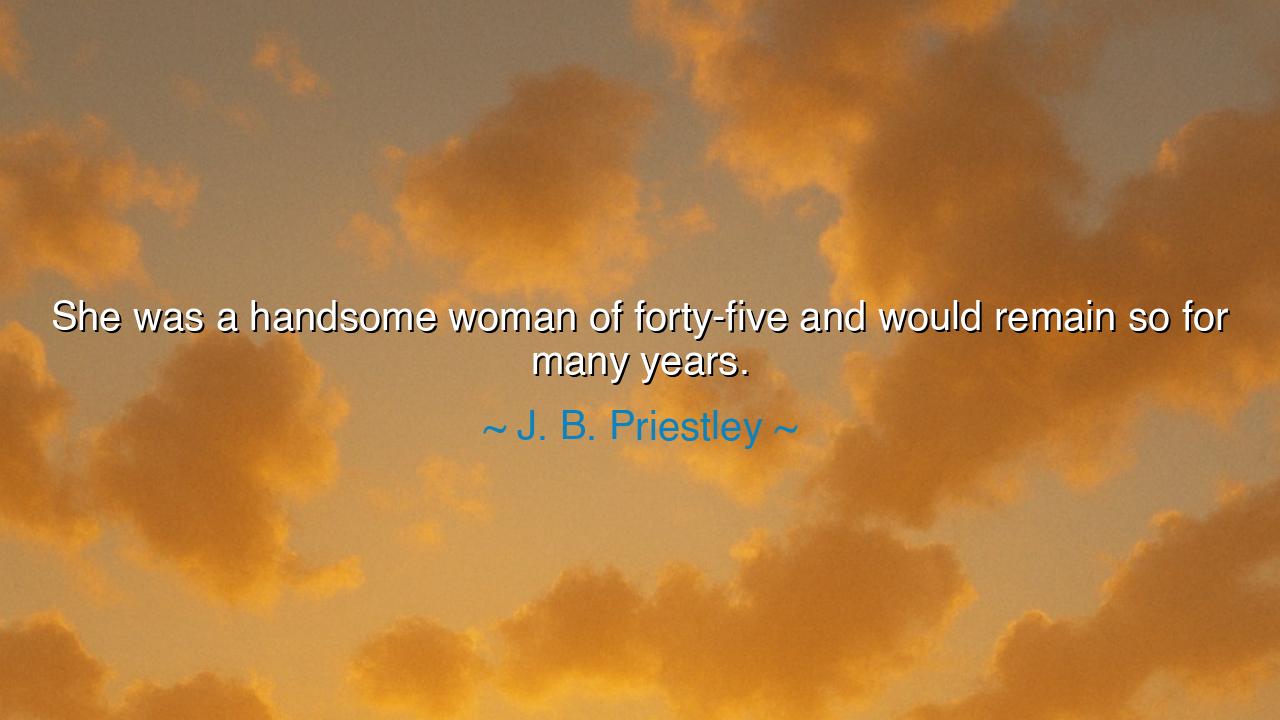
She was a handsome woman of forty-five and would remain so for






“She was a handsome woman of forty-five and would remain so for many years.” Thus wrote J. B. Priestley, a master of human observation, whose pen could reveal whole worlds in a single line. At first glance, the words seem simple — an elegant description of a woman in her maturity. But beneath their quiet grace lies a profound reflection on beauty, time, and the enduring power of character. Priestley does not merely describe the woman’s appearance; he captures the still flame of her presence, the kind of beauty that neither youth nor age can touch. In his words, there is no nostalgia for lost youth, but rather reverence for the serenity that comes when a soul has lived and learned.
In the ancient days, philosophers spoke of two kinds of beauty. The first was fleeting — the bloom of youth, bright as dawn, vanishing as quickly. The second was eternal — born of virtue, wisdom, and harmony of spirit. Priestley’s “handsome woman” belongs to this second order. Her beauty is not in the perfection of her skin or the shimmer of her hair, but in the balance of her being. She has lived through seasons of laughter and sorrow, and they have shaped her not into frailty, but into grace. Hers is a beauty that has ripened rather than faded, a testament to the nobility that age can bestow when the heart remains luminous.
To call her “handsome” rather than “beautiful” is no accident. In Priestley’s time, the word “handsome” carried a deeper dignity — it spoke of stature, confidence, and moral strength. It was beauty with backbone, elegance with endurance. To be a “handsome woman” was to be seen not merely for one’s face, but for one’s presence — the quiet authority that enters a room and commands respect without a word. Priestley’s praise, then, is not flattery but recognition. He sees in her a soul so anchored in itself that time, which steals from the vain, can only polish her further.
Consider the story of Eleanor Roosevelt, who, though often mocked for lacking conventional charm, became one of the most beloved and admired women of her century. Her beauty was not in her features, but in her courage, compassion, and conviction. As she aged, the lines on her face became the map of her service to humanity — each wrinkle a signature of experience. Like Priestley’s woman, she remained handsome for many years, for her beauty was drawn not from the mirror, but from the well of purpose within her.
Priestley’s line, then, is not merely about one woman — it is about the triumph of the inner over the outer, the eternal over the ephemeral. In a world that worships youth and fears age, his words stand like a lantern in the dark, reminding us that true beauty does not fade; it deepens. The passage of years does not diminish those who live with grace, but rather clarifies their essence, as time polishes a gem until it glows from within.
Yet this kind of enduring beauty is not given — it is earned. It comes from a life lived with integrity, from choices made in kindness, from strength tempered by humility. Those who chase the shallow image of youth will find their reflections fleeting, but those who cultivate the beauty of character will find themselves radiant long after the world forgets their age. Priestley’s woman “remains handsome” because she remains true — steadfast in who she is, unmoved by the shifting winds of vanity.
The lesson, then, is both gentle and powerful: honor the beauty that lasts. Care for your face and form, yes, but care even more for your spirit. Let your laughter carve kindness into your cheeks, your compassion light your eyes, your courage steady your stance. For these are the features that time cannot erode. When you live rightly, age becomes not an enemy, but an ally — revealing the strength, grace, and depth that only years can bring.
So, O seeker of eternal youth, remember Priestley’s wisdom. The bloom of twenty may fade, but the light of forty-five — when nourished by wisdom — can shine for decades. Let your beauty be one that remains, not because time forgets you, but because your spirit continues to unfold. Be, like the woman Priestley praised, handsome in soul, unshaken by age, radiant with the quiet fire of one who has truly lived. For in the end, it is not youth that endures — it is the heart that refuses to grow old.






AAdministratorAdministrator
Welcome, honored guests. Please leave a comment, we will respond soon